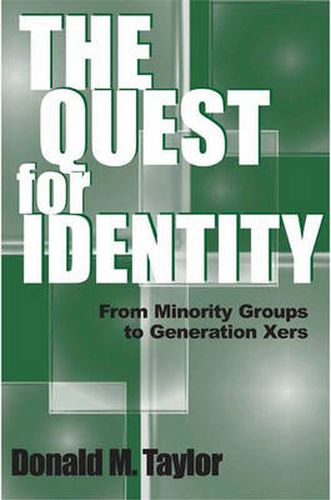Readings Newsletter
Become a Readings Member to make your shopping experience even easier.
Sign in or sign up for free!
You’re not far away from qualifying for FREE standard shipping within Australia
You’ve qualified for FREE standard shipping within Australia
The cart is loading…






Examples groups experiencing profound social problems and proposes possible solutions. There are groups in society that experience profound social problems, and there are others that show signs of a growing social malaise. The problems include massive academic underachievement, family dysfunction, substance misuse, violence, and delinquent behavior. In the United States and Canada, this highly unflattering profile applies to Aboriginal people, African Americans, and certain Hispanic groups. To this list, Taylor adds the ever-growing number of so-called street kids that roam inner-city streets, and, finally, to a lesser, but no less frightening extent, he adds what have traditionally symbolized society’s most privileged group–young, white men. As Taylor points out these are not the only groups who stand out as noticeably disadvantaged, but they are among the most visible, and due to his research and activities, groups that allow him to test his arguments and offer his proposals for change. Drawing upon his research experience in Canada, the United States, South Africa, and Indonesia, Taylor examines the impact of assimilation, and policies of cultural diversity and multiculturalism on these groups. He offers surprising insights into the causes of group malaise and individual failure, and his conclusions are bound to be of significant interest to scholars, students, and researchers involved with intergroup dynamics and cultural diversity.
$9.00 standard shipping within Australia
FREE standard shipping within Australia for orders over $100.00
Express & International shipping calculated at checkout
Examples groups experiencing profound social problems and proposes possible solutions. There are groups in society that experience profound social problems, and there are others that show signs of a growing social malaise. The problems include massive academic underachievement, family dysfunction, substance misuse, violence, and delinquent behavior. In the United States and Canada, this highly unflattering profile applies to Aboriginal people, African Americans, and certain Hispanic groups. To this list, Taylor adds the ever-growing number of so-called street kids that roam inner-city streets, and, finally, to a lesser, but no less frightening extent, he adds what have traditionally symbolized society’s most privileged group–young, white men. As Taylor points out these are not the only groups who stand out as noticeably disadvantaged, but they are among the most visible, and due to his research and activities, groups that allow him to test his arguments and offer his proposals for change. Drawing upon his research experience in Canada, the United States, South Africa, and Indonesia, Taylor examines the impact of assimilation, and policies of cultural diversity and multiculturalism on these groups. He offers surprising insights into the causes of group malaise and individual failure, and his conclusions are bound to be of significant interest to scholars, students, and researchers involved with intergroup dynamics and cultural diversity.